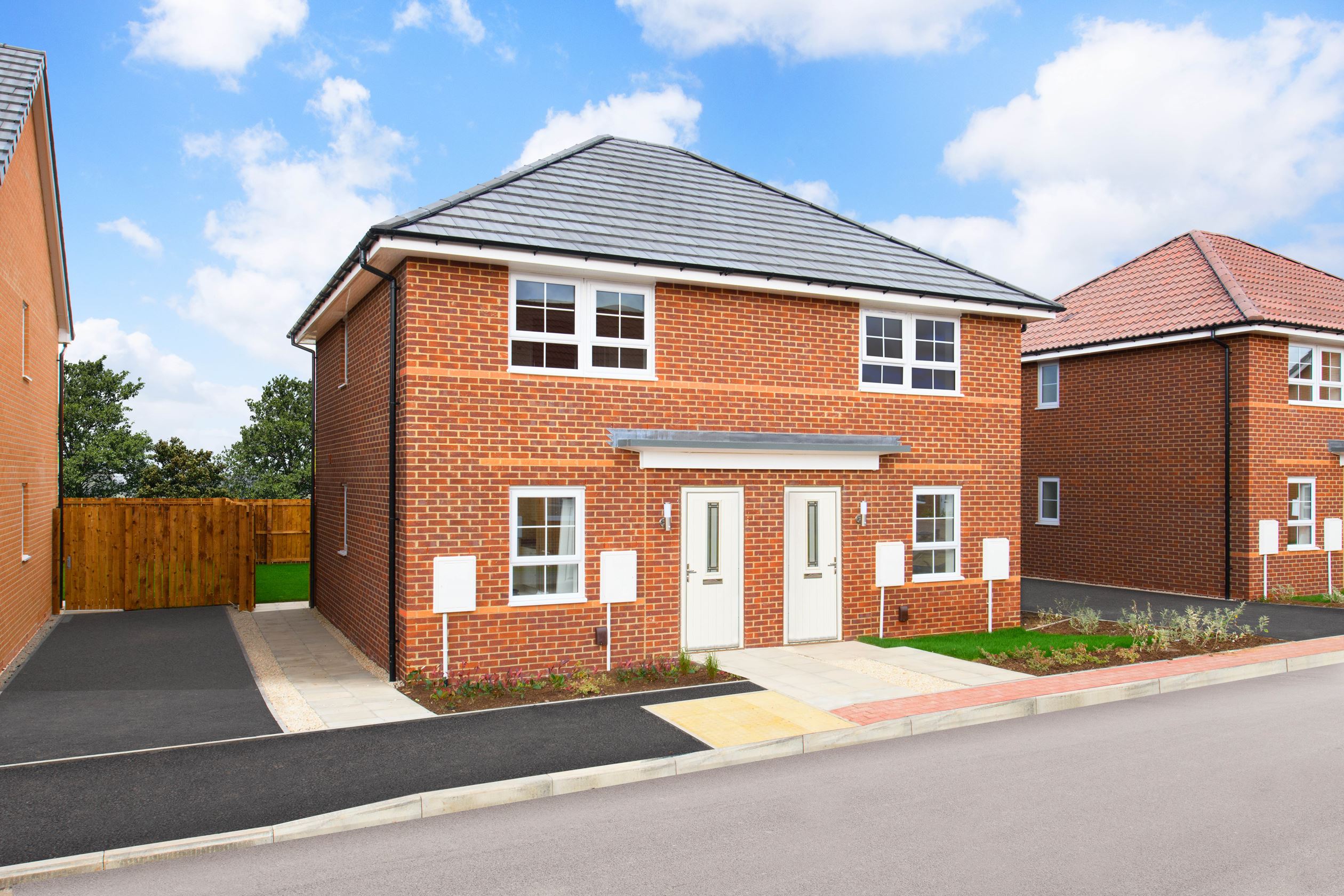Downsizing to a smaller home
Thinking about moving into a smaller home? Whether you're looking to cut costs or relocate to a place that better suits your lifestyle, downsizing can be a smart and rewarding step.
In our guide, we’ll walk you through how to downsize your home, from practical downsizing home tips to understanding your motivations for moving and making the most of your new space.
What does downsizing your home mean?
Downsizing refers to the process of moving to a smaller home. It might feel like a step back after moving up the property ladder, but downsizing can be a smart financial move. It can help reduce your outgoings and make day-to-day living easier.
Why downsize?
People often consider downsizing when their needs and priorities shift. Perhaps your children have moved out, your space feels too big to maintain or you'd like to unlock the value of your home to save for the future.
There is an upside to downsizing – a smaller home can often mean less stress, more financial freedom and a lifestyle that better suits your current situation.
Financial benefits of downsizing
One of the biggest advantages of downsizing your house is the financial freedom it can bring you. This can come in a few ways:
Unlocking home equity
When you own a home, its value builds over time – especially if you’ve paid off part or all of your mortgage. The difference between what your home is worth and what you still owe is called equity.
By selling your current home and moving to a lower-cost one, you can unlock that equity. This could help you buy your next place outright, top up your savings or fund future plans, like travel or home improvements.
Lower mortgage payments
If you're moving from a larger home, downsizing often means a smaller mortgage. In some cases, it could even allow you to buy your next home outright. Speak to a mortgage adviser to understand how your equity could help you reduce or eliminate borrowing costs.
Reduced running costs
Smaller homes are typically more energy efficient. With fewer rooms to heat and light, you’re likely to see lower gas and electricity bills. Many people find they also spend less on household essentials, from cleaning products to everyday maintenance.
If you're moving into a new build, you may benefit even further from improved insulation, energy-saving appliances and lower overall energy use. If you're purchasing with us, our new build homes are designed with energy efficiency in mind.
Lower council tax
Council tax is based on the value of your home. Many smaller properties fall into a lower band, helping you cut costs after you move.
If saving money is part of your reason for downsizing, make sure to check the council tax band of any home you’re considering online at GOV.UK.
More affordable maintenance
From everyday cleaning products to occasional repairs and professional services, a smaller home usually means you'll spend less on upkeep. Whether it's a smaller roof to maintain or fewer windows to clean, this can help reduce your expenses over time.
Key considerations before downsizing
Downsizing is a big decision, and you might find yourself wondering: how do I downsize? Being prepared can make all the difference. Before you start making plans, take a moment to consider whether it’s right for you.
What are the financial costs of downsizing?
While downsizing can offer long-term savings, it still comes with upfront costs. Being aware of these early can help you plan accordingly and avoid surprises along the way.
Common expenses to factor in include:
- Estate agent fees – usually a percentage of your sale price
- Legal and conveyancing fees – for both selling and buying
- Removal costs – including professional movers or van hire
- New furnishings or adjustments – you may need furniture to accommodate your smaller space
It’s also worth setting aside a buffer for unexpected costs, such as storage, minor repairs or last-minute purchases.
Do you pay tax when downsizing?
In most cases, you won’t need to pay tax when selling your main home. But depending on your situation, you might have to pay:
- Stamp Duty – you don’t pay Stamp Duty when selling, but you will likely need to pay it on your next home
- Capital Gains tax – this usually doesn’t apply if the home you’re selling has been your main residence, but it might if you’ve rented out part of it or used it for business purposes
Tax rules can vary depending on your circumstances, so it’s a good idea to speak to a solicitor or a tax adviser before committing to a move.
Is downsizing right for you?
If you’re starting to think seriously about downsizing, here are some important questions to consider:
- Am I using all the space in my current home?
- Would I prefer a smaller space in a better location?
- Do I want to reduce the time, cost and effort that comes with home upkeep?
- Am I emotionally ready to let go of my current property?
- Can I afford the upfront costs involved?
Answering these questions honestly can help guide your next steps.
When is the right time to downsize?
There’s no perfect moment to downsize, but some situations can make the timing feel right. You might choose to move when the housing market is strong and your home’s value is high, or when your current space starts to feel less practical. For some, it’s about planning ahead. For others, it’s simply recognising when it’s time for a change.
What to avoid when downsizing your house
Downsizing can be a great fresh start, but it’s worth being mindful of a few common mistakes:
- Rushing the process – take time to consider your needs and explore your options
- Underestimating costs – factor in legal fees, removals, furnishings and any refurbishments in your budget
- Choosing based on emotion, not practicality – a charming cottage might seem appealing, but make sure it suits your lifestyle long-term
- Forgetting about storage – avoid ending up with more belongings than you have space for, or relying on a storage unit indefinitely
- Overlooking resale value – consider making improvements to make your home more appealing to future buyers
Finding your new home
Finding the right new home depends on your specific needs and goals. But there are plenty of options to choose from, including:
Smaller houses
Prefer to stay in a traditional home? A smaller house keeps the comfort and privacy you’re used to, but with fewer rooms to manage and lower running costs. It’s a great choice if you still want outdoor space or room for guests.
Flats
If low maintenance is a top priority, a flat could be an ideal option. Many come with added perks like communal gardens and better access to lifts or ground-floor living. This is particularly useful if you’re planning for retirement or want a home that supports easier mobility.
Some people also find that flats offer a greater sense of security, thanks to gated entrances, intercom systems and living close to neighbours.
Bungalows
With all your living space on one floor, bungalows are easy to maintain. They’re a great option if you’re raising young children and want to avoid accidents, or if you’re after a home that’s easier to manage in the years ahead.
Shared ownership homes
With smaller upfront costs, shared ownership can be a good option if saving money is your primary goal. You buy a percentage of the property and pay rent on the rest, which may offer more flexibility if you're not ready to commit to a full purchase. Speak to a mortgage adviser to help you decide if it’s the right choice for you.
Retirement communities
If you're entering later life, a retirement community could be worth considering. These homes are low-maintenance and often feature an on-site support team, as well as amenities and communal spaces, making it easier to feel connected while providing the freedom to live independently.
Preparing for your move
Once you’ve decided that downsizing is right for you and you’ve made an offer on a new home, it’s time to plan your move. These simple downsizing house tips can help you make the transition to your new home as smooth as possible.
Declutter your current home
Be realistic about what will fit in your new space and focus on keeping the things you truly value or use often. It can help to work on one room at a time. Start early and sort items into keep, donate, sell or recycle piles to make the process more manageable.
Pack with purpose
Packing efficiently can make a big difference when you're moving to a smaller home. These tips can help you stay organised:
- Start early and pack in stages – begin with items you use less often and work through one room at a time
- Label boxes clearly – include the room they belong to and mark anything you’ll need right away to make unpacking quicker
- Take photos of electronics and valuables – so you know where cables go and have a record of what you packed
- Keep a separate essentials box– set aside everything you’ll need in the first few days, like toiletries, chargers and important documents
- Don’t pack what you don’t need – treat packing as a final decluttering opportunity
- Digitise paperwork where you can – scanning documents can reduce clutter and free up storage space in your new home
- Use storage or packing services – they can save you time, effort and space
Settling into your new home
Moving to a smaller home is an exciting opportunity to create a space that works for you. While it might feel like a big change at first, many people discover that a more compact home brings unexpected benefits – from easier maintenance to a greater sense of cosiness and connection with their surroundings.
Adjusting to a smaller space
Give yourself time to adjust. Moving to a smaller home can feel like a big change, but it doesn’t mean compromising on comfort. With a few simple changes, your new space can begin to feel like home.
Start by unpacking the essentials and consider how you want to use each room. You might find new routines and layouts that work even better than before.
Here are some simple ways to make the most of your space:
- Multi-functional furniture – like sofa beds or storage ottomans
- Wall-mounted shelves – free up floor space and reduce visual clutter
- Smart lighting – make rooms feel brighter and more spacious
- Keep it simple – a clutter-free space can help create a calmer, more comfortable home
Making the most of your new lifestyle
A smaller home can lead to a simpler, more fulfilling way of living – one that gives you back time, energy and space for what really matters.
With fewer household tasks and lower running costs, you may find yourself with more freedom to focus on the things you enjoy. Whether it’s spending time with family, exploring a new neighbourhood or slowing down, downsizing can help you reinvent what home life looks like for you.
Thinking about downsizing? Browse our range of brand-new homes across the UK and discover our fantastic offers.
Contact or visit our Sales Advisers today to start your homebuying journey today.
FAQs
-
The benefits of downsizing can include lower living costs, less maintenance and a home that better suits your current lifestyle. It can also free up space, time and money for the things that matter most.
-
While downsizing has its benefits, you should be prepared for the upfront costs, including moving fees, Stamp Duty and new furniture. It can also take time to adjust to a smaller space, so consider how you’ll manage storage.
Our Offers to Help Get You Moving
Help to Sell
If you’re looking to start your next adventure, but are worried about the hassle of moving, we have a range of schemes available to help you sell your existing home.
Part Exchange
We could be your guaranteed buyer, so no stress or fuss, just an easy move for you and your family.
Low Deposit Offers
If you have a low deposit, we have a variety of schemes available to help make moving more affordable.
Own New - Rate Reducer
Own New - Rate Reducer is a brand-new scheme available on new build homes that could mean lower mortgage rates and reduced monthly payments.
Movemaker
We could help you arrange to sell your existing home, so you'll have no estate agent fees to pay.



